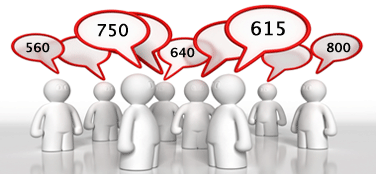

- Credit 101
- Teaching Tools
- Scores
- Life Stages
- Credit Mishaps
- Understanding Different Bankruptcy Chapters
- Your Credit Report After a Bankruptcy
- Understanding Judgments
- Inaccuracies on Your Credit Report
- Disputing Credit Report Errors
- Understanding Foreclosure
- The Foreclosure Process & What To Do Afterwards
- Understanding Identity Theft
- In the event of: The Death of a Spouse
- Rebuilding Your Credit
- Choosing a Reputable Credit Counselor
- Avoid the Downside of Credit Mismanagement
- What is a Credit Freeze
- Worksheets & Letters
- 6 Steps to Creating a Budget
- Household Budget: Wants vs Needs
- Personal Budget Template
- Understanding Amortization Schedules
- Loan Amortization Calculator
- Sample Opt-Out Letter
- Sample Dispute Letter
- Annual Credit Report Request Form
- Auto Loan Payment Calculator
- Back-to-School Budgeting
- Cost of Credit
- Emergency Fund
- How Much Car Can You Afford
- How Much House Can You Afford
- How Much Will College Cost
- How Much Will My Loan Cost
- How Will My Savings Grow
- Mortgage Payment
- Mortgage Refinancing
- Pay Down Debt or Invest
- Repaying Student Loans
- Retirement Fund
- Rework Your Budget
- Saving for a Goal
- Should I Consolidate My Debt
- Travel Budgeting
- Your Holiday Budget
- Buying a House
- 5 Steps to Buying a Home
- 5 C's of credit When Applying for a Loan
- What Score is Needed to Purchase a Home
- Using a Realtor
- Understanding Fixed Rate Mortgages
- Understanding FHA Loans
- Understanding VA Loans
- Understanding Interest Only Loans
- Understanding ARM Loans
- Understanding Combo Loans
- Understanding Streamline K Loans
- Understanding Bridge Loans
- Understanding HELOC (Home Equity Line of Credit)
- Understanding Reverse Mortgages
- Basic Mortgage Underwriting Principles
- Credit & Financial Law
- Home

10 Things Every Student Loan Borrower Needs to Know
12 Steps for Students to Use Credit Cards Wisely
Avoid the Downside of Credit Mismanagement
Getting Started: Ways to Establish Credit

Getting Started: Ways to Establish Credit
Establishing a good credit history has never been as important as it is today. It's not just that you'll need good credit to get decent rates when you're ready to buy a home or a car. Your credit history can determine whether you get a good job, a decent apartment, a deal on your cell phone and reasonable rates on insurance. One seemingly minor misstep -- a late payment, maxing out your credit cards -- can haunt you for years. If you're just starting out, you have a once-in-a-lifetime opportunity to build a credit history the right way. Here's what to do and what to avoid.
You'll first want to see what, if anything, lenders are saying about you.
- Establish checking and savings accounts
Here's a basic step that's sometimes overlooked by people seeking credit. Lenders see bank accounts as signs of stability. Opening checking and savings accounts is also one of the few things you can do as a minor to start building a financial history. While you can't get a credit card in your own name until you're 18 and can be legally held to a contract, many banks have no problem letting you open an account.
- Understand the basics of credit scoring
You need to know that the two most important factors in your scores are:
- Whether you pay your bills on time.
- How much of your available credit you actually use.
It's essential that you pay all your bills on time, all the time. You also don't want to max out any of your credit cards, or even get close. Keeping your credit use to less than 30% of your credit limits (10% is better) will help you get the best possible credit scores -- and should help keep you from getting over your head in debt, as well. Finally, you don't need to carry a balance on a credit card to have good credit scores. Paying your bill in full each month is the best way to keep your finances in shape and build your credit at the same time.
- Apply for credit while you're a college student
Credit experts used to warn college students away from those booths set up on campus by credit card lenders -- the ones that promise free stuff for signing up. Lenders are willing to take risks with you that they won't once you graduate, probably because they know that your parents' willingness to bail you out will end once you get your sheepskin.You still have to exercise some caution, though. Look for a card with a low or nonexistent annual fee and low interest rates. For now, just get one: Opening a slew of credit accounts in a short period of time can make you look like a risky customer and these types of multiple inquiries can hurt your score.
- Apply for a secured credit card
If you can't get a regular credit card, apply for the secured version. These require you to deposit money with a lender; your credit limit is usually equal to the deposit. Screen your card issuer carefully. Some charge outrageous application or annual fees and punitively high interest rates.Your credit union, if you have one, is a good place to look for a secured card. Ideally, the card you pick would:
- Have no application fee and a low annual fee
- Convert to a regular, unsecured credit card after 12 to 18 months of on-time payments
- Be reported to all three credit bureaus.
- Get a store card
Gas companies and department stores that issue charge cards typically use finance companies, rather than major banks, to handle the transactions. These cards don't do as much for your credit scores as a bank card (Visa, MasterCard, Discover, etc.), but they're usually easier to get. Again, don't go overboard. One or two of these cards is enough.
- Get an installment loan
To get the best credit scores, you need a mix of different credit types, including revolving accounts (credit cards, lines of credit) and installment accounts (auto loans, personal loans, mortgages). Once you've had and used credit cards responsibly for a year or so, consider applying for a small installment loan from your credit union or bank. Keeping the duration short -- no more than a year or two -- will help you build credit while limiting the amount of interest you pay.
- Use revolving accounts lightly but regularly
For credit scores to be generated, you have to have had credit for at least six months, with at least one of your accounts updated in the past six months. Using your cards regularly should ensure that your report is updated regularly. It also will keep the lender interested in you as a customer. If you get a credit card and never use it, the issuer could cancel the account.
